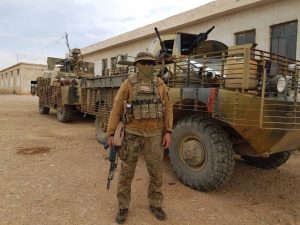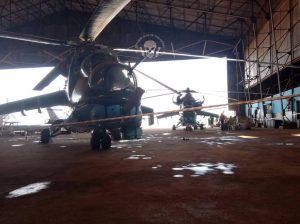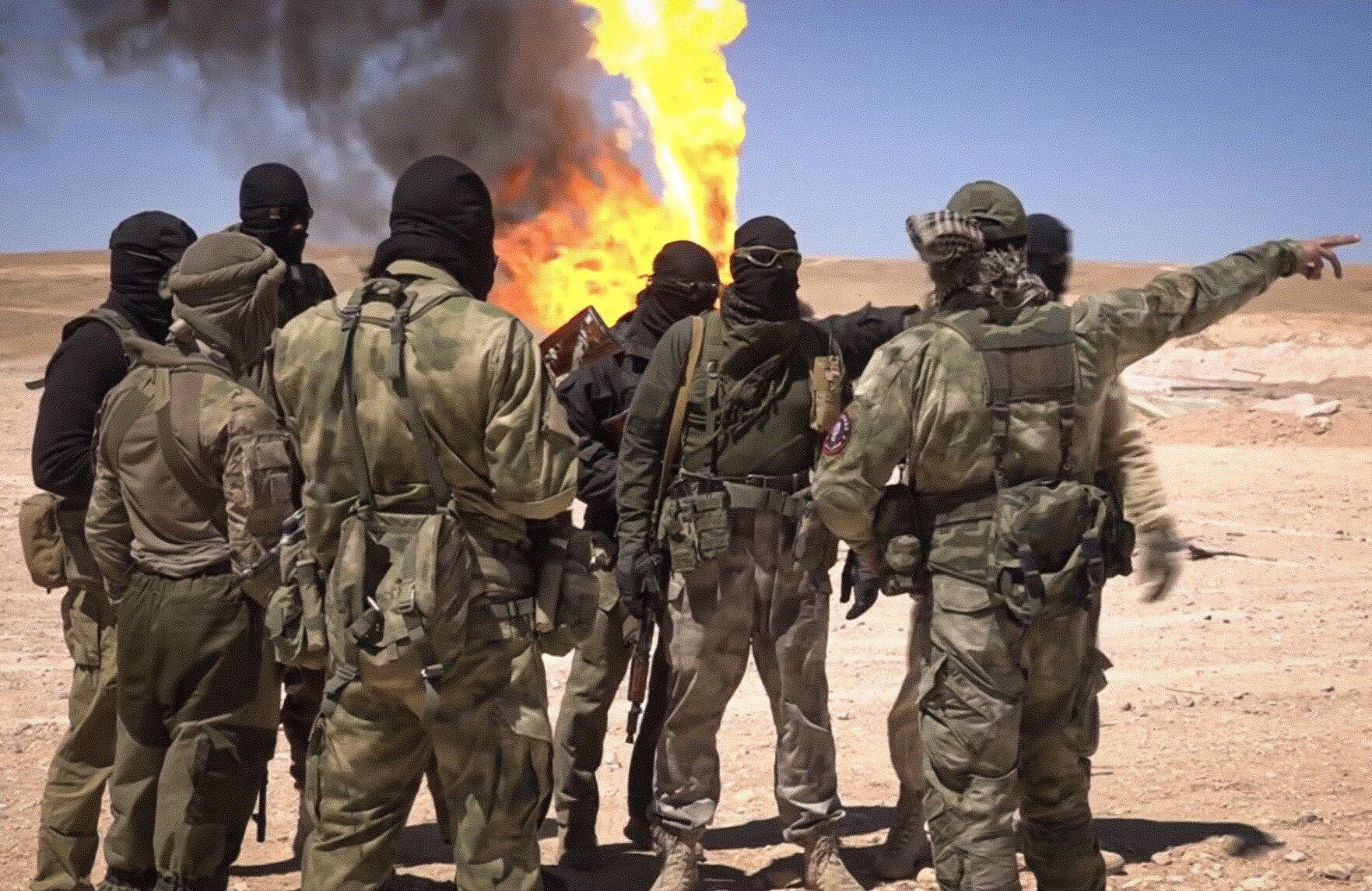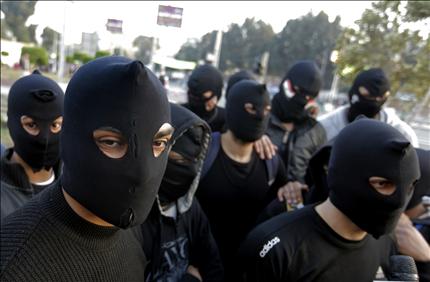The Wagner Group, or CHVK Vagner (Частная Военная компании Вагнера), is an informal paramilitary group, often mistakenly referred to as a private military company, which has become a defining feature of the terms „Grey Zone“ and „Hybrid War“ in recent years and is undoubtedly one of the key elements of the Russian concept of Hybrid War (Гибридная война). But what are we talking about here in connection with hybrid warfare? The Russian concept of Hybrid War, as described by Russian Chief of General Staff Valery Gerasimov in his notorious 2013 article, includes a combination of conventional and unconventional tools, such as regular military forces, special and irregular forces, support for local unrest, „information weaponization“ and propaganda, diplomacy, cyber-attacks, and economic warfare.
The Wagner Group is used by the Kremlin as a strategic proxy tool that can be deployed wherever Russia has strategic interests. Europe, the Middle East, Africa, and Latin America. Thanks to the Wagner Group, Russia could previously afford to undertake sometimes risky covert operations[1] while still maintaining the ability to plausibly deny such operations. In doing so, it has generally sought to avoid international accountability for these operations. Interestingly, however, the de jure Wagner Group never actually existed. It was not registered anywhere in the world to strengthen its plausible deniability. The Group’s financing by Russia has been carried out in a sophisticated manner through a large number of diversified sources. Today, however, we can no longer discuss any concept of plausible deniability, because the link between the Wagner Group and Moscow is all too obvious. Despite this, Russia continues to actively use the Wagner Group as its elite proxy tool.
This article aims to analyze the history of the formation and operational activities of the Wagner Group. It is undoubtedly a very popular security phenomenon, which demonstrates that hybrid warfare is not, as it might seem today, only disinformation, psychological and influence operations, but also traditional high-risk high-reward foot on the ground operations.
Early History of the Wagner Group
The founder of the group is generally considered to be retired Lieutenant Colonel Dmitry Utkin. The name „Wagner Group“ then very likely comes from Utkin’s call sign „Wagner“, which he used during his active military career. Utkin is a veteran of both Chechen wars, in which he served as a member of the GRU’s Second Independent Brigade and is believed to have retired to civilian life in 2013. However, it is possible that even after his retirement he is still operating in the GRU (now GU) structures in a state of high secrecy [1].
Even before the Wagner Group itself was established, Utkin founded the private security agency Moran Security Group in 2013 together with several other Russian war veterans. This company was internationally known as an executor of anti-piracy maritime security contracts. In the same year, Moran Security Group merged with Slavonic Corps Limited (Славянский Корпус), a Hong Kong-registered organization founded by two former Moran Security Group members, Vadim Gusev and Yevgeny Sidorov [2]. This was an attempt by Moran Security Group to expand its services and therefore its operations. The timing here is also interesting, as the Syrian Civil War was in full swing at this time. Slavonic Corps has been operating in Syria since 2013, protecting government pipelines and oil wells in the Deir ez-Zor area. Slavonic Corps reached a strength of up to 267 contractors there [2]. These were mainly former members of Russian SOBR, OMON, Spetsnaz FSB, Spetsnaz GRU, or VDV units. Utkin also participated in this mission where he commanded the ethnic Russians involved in this contract. Some members of the Slavonic Corps were later arrested by the FSB in Russia during 2014 precisely for mercenarism, which is punishable under Article 359 of the Russian Criminal Code [3]. However, this move by the FSB can be seen as a step of the aforementioned plausible deniability. Thus, it is possible that the convicted Slavonic Corps members did not serve their prison sentences.
Yevgeny Prigozhin – Russian oligarch and de facto head of the Wagner Group
The person of Russian oligarch Yevgeny Prigozhin has been associated with the Wagner Group since its inception in 2014 when the Group began operating in Ukraine. Through Prigozhin, the Group is deeply connected to the Russian political leadership, which distinguishes it from similar entities. The Wagner Group’s geopolitical footprint is in direct coordination between Prigozhin business aspirations and the Kremlin’s national interests. Prigozhin thus benefits from the Wagner Group’s provision of services in countries where Russia is expanding its influence precisely through Prigozhin and his business. Thus, Russia still maintains the possibility of plausible deniability through its use of Prigozhin’s private capabilities and structures. In the process, Prigozhin accumulates prestige and political capital, paving the way for future lucrative contracts for the Russian Federation [4].
Prigozhin’s talent for profit has led him on an unconventional path to Putin’s trust. After spending nine years in prison, he opened a hot dog stand with his stepfather in 1990. After the collapse of the Soviet Union, Prigozhin invested in St. Petersburg’s first supermarket chain and eventually opened the famously luxurious New Island restaurant, where he served President Vladimir Putin. From the middle of the first decade of the 20th century, Prigozhin used his superior contacts to win state contracts in military and school catering, earning him the nickname „Putin’s Chef“ [3].
Activities in Ukraine
At this point, it should be noted that a Russian-speaking member of a quasi-private military company dressed in camouflage uniform and armed with a Kalashnikov assault rifle is not necessarily a member of the Wagner Group. There are dozens of Russian quasi-private military companies operating around the world, especially in the Middle East and Africa, but only the Wagner Group is considered a true proxy tool of Russia because its connection to Russia’s top political and military leadership is genuine and its military capabilities far exceed what other companies are able to offer [5].
The Wagner Group has been active in Ukraine since 2014 when it began operating mainly in Crimea and the Donbas region [5]. In this first phase of the war in Ukraine, Wagner Group played only a minor supporting role, with its contractors acting as members of the Russian special forces – the little green men. As the conflict escalated, the Wagner Group began to perform much more complex military tasks. This included their involvement in the Donbas campaign, where they cooperated with separatists from the Luhansk and Donetsk People’s Republics, to whom they provided military advisory and training services. Probably the largest military operations in which Wagner Group contractors participated were the battles for Donetsk and Luhansk airfields and Debaltseve [5]. In general, it could be said that the roles and missions that Wagner Group has performed/is performing in Ukraine are primarily of a special character, as Wagner Group contractors possess superior training and military equipment compared to entities of a similar nature. These include in particular the application of irregular warfare (ambushes, raids, diversionary attacks), military advisory activities, the provision of human intelligence, as well as the provision of air defence [6]. At the turn of 2017 and 2018, the Group was also involved in the removal of Igor Plotnitsky from power in the Luhansk People’s Republic [6]. However, despite all of the above, the Wagner Group has maintained a relatively low profile since 2015, which can likely be explained by the transfer of their main area of operations to Syria.
Ukraine thus became the first battleground where the ethos of the „Russian contractor“ began to be cultivated. This fact cannot be underestimated, as the Wagner Group is actively playing a Slavic note with its social media propaganda, thereby targeting the minds of all Russian-speaking people living in Eastern Europe. This issue is also related to what I suggested at the beginning of this chapter. A person unfamiliar with the subject might think that every Russian contractor is probably a member of the Wagner Group, but this is not true. Moreover, this huge generalization helps the Wagner Group to „fit in“ with other entities like it, of which there are a very large number recently. This may further strengthen the level of secrecy of their operations, as well as the possibility of plausible deniability, whereby it could then be said that the Wagner Group is not responsible for the activity being denied, but rather „the other“ group.
Activities in Syria

From around the autumn of 2015, following the Russian Federation’s entry into the Syrian civil war, the Wagner Group began to appear in Syria, where it is likely still operating on the side of the Assad government forces, albeit in very limited numbers [5]. In contrast to its activities in Ukraine, the Wagner Group’s activities in Syria are relatively notorious, as it has mainly carried out traditional military activities there. The Group has operated in Palmyra, around Deir ez-Zor, near Hama, and in Idlib. In these places took place very heavy fighting, in which the members of the Wagner Group directly participated and achieved here mixed combat successes. At Deir ez-Zor, they clashed with the American-backed SDF in 2018. The Wagner Group suffered substantially heavy losses there, with even some unofficial Russian sources reporting more than 100 members dead [5]. At the height of their involvement in the Syrian conflict, the Group had up to 2500 men in the country, entering the conflict with around 1,000 men [3]. Currently, their numbers in Syria have decreased dramatically. According to some sources, they are no longer operating there at all. Rather, the reality is that a limited number remain in the country, acting as training instructors and military advisors to government forces.
Activities in Africa

Africa is one of the last places where the Wagner Group became active. The Group started to appear on the African continent at the turn of 2017 and 2018 and is still active there today.
In the Central African Republic, the Group had a contract to protect state-owned diamond and gold mines in return for a share of the profits from mining [7]. During the Group’s operations in the Central African Republic, an incident occurred in which three Russian journalists who were filming a documentary on Russian mercenaries in the country were murdered. These murders are most often attributed to members of the Wagner Group. However, it is worth noting that other Russian structures may have had an interest in the deaths of the journalists. There is also the possibility that they may have been killed and robbed by a marauding band of robbers, of which there are many in the area. The Wagner Group also ensured the smooth running of the presidential elections here from the beginning of 2021, in which Faustin-Archange Touadéra was elected [7]. At the same time, members of the Group were involved in the counter-offensive against the rebels, working closely with members of The United Nations Multidimensional Integrated Stabilization Mission in the Central African Republic (MINUSCA).
The same contract was fulfilled by the Group in Sudan. However, the rate of profitability of this contract was lower as it involved private mines that were not owned by the state. In Sudan, however, they were also involved in the field of military advisory services by training the Sudanese army [7]. In Madagascar, they guarded the chrome mines and were also involved in ensuring the smooth running of the presidential campaign [5].
Of particular importance is their current involvement in Libya, where since late 2018 they have been fighting on the side of Marshal Khalifa Haftar’s Libyan National Army, which primarily controls the east of Libya. There, their numbers currently reach up to 2,000 men with bases in Sirte and Jufra [5]. In 2019, several hundred members of the Group participated in the siege of the town of Sabha, around which Libya’s largest oil fields are located. In Libya, the Group’s members focus mainly on conducting actual combat operations, military advisory activities and, more recently, on providing specialized air defence against Turkish Bayraktar TB2 combat drones, which proved highly effective, particularly in the recent Nagorno-Karabakh conflict [8].
Cooperation between the Wagner Group and the Armed Forces of the Russian Federation – close cooperation, joint bases, and logistics
In the conflicts in Ukraine and Syria, where the Group operated alongside the regular Russian army, there was evidence of cooperation between its members and Russian soldiers. The Wagner Group relies heavily on Russian military infrastructure. The use of shared bases, intelligence support, the transport capabilities of Russian military aircraft, and military medical services is common. There are also documented instances of Russia providing cover documents to members of the Group [9]. The Group’s main base is located in the town of Molkino in the Krasnodar district of Russia. What makes this facility very unusual is that it is operated jointly with the GRU’s 10th Independent Special Purpose Brigade. The fact that the Molkino base operates as it does means that relations between the GRU and the Wagner Group are indeed delicate [9].
Conclusion
The Wagner Group is just one piece of the mosaic of the Russian concept of the Hybrid War. As such, however, it is a demonstrably effective tool whose uses, like the rest of Russia’s other quasi-private military companies, are constantly being cultivated by Russia. Yes, it is true that the ability to plausibly deny the Wagner Group’s connection to its donor, i.e., the top Russian political and military leadership, including its connection to the GRU military intelligence service, can no longer be used effectively today, as the Wagner Group has become an icon of the „Grey Zone“ phenomenon and Russia’s expansion into the Middle East and Africa. Despite this, however, it is still a very effective tool that has a now superior and wide range of military capabilities that are constantly being increased.
For further research, it would be very interesting to use the general insights provided by this article to focus on, for example, how the Wagner Group’s military capabilities have evolved.
Footnotes
[1] In covert operations, there is no call for secrecy in its conduct. A covert operation may be linked to its executor, whose identity is not sought to be kept secret, but the identity of its sponsor is kept secret. In contrast, clandestine operations are completely secret. Thus, it is not known whether they are taking place, who the executor is or who the sponsor is.
List of sources used
[1] Bellingcat. (2020). “Putin Chef’s Kisses of Death: Russia’s Shadow Army’s State-Run Structure Exposed.” Accessed from: https://www.bellingcat.com/news/uk-and-europe/2020/08/14/pmc-structure-exposed/ (17. 12. 2021).
[2] Sukhankin, Sergey. (2019). “Russian PMCs in the Syrian Civil War: From Slavonic Corps to Wagner Group and Beyond.” The Jamestown Foundation. https://jamestown.org/program/russian-pmcs-in-the-syrian-civil-war-from-slavonic-corps-to-wagner-group-and-beyond/
[3] Reynolds, Nathaniel. (2019). “Putin’s Not-So-Secret Mercenaries: Patronage, Geopolitics, and the Wagner Group.” Carnegie Endowment for International Peace. https://carnegieendowment.org/2019/07/08/putin-s-not-so-secret-mercenaries-patronage-geopolitics-and-wagner-group-pub-79442
[4] Rabin, Alexander. (2019). “Diplomacy and Dividends: Who Really Controls the Wagner Group?” Foreign Policy Research Institute. https://www.fpri.org/article/2019/10/diplomacy-and-dividends-who-really-controls-the-wagner-group/
[5] Doxsee, Catrina and Jones, Seth G. (2021). “Russia’s Corporate Soldiers: The Global Expansion of Russia’s Private Military Companies”. Center for Strategic and International Studies. https://csis-website-prod.s3.amazonaws.com/s3fs-public/publication/210721_Jones_Russia%27s_Corporate_Soldiers.pdf?7fy3TGV3HqDtRKoe8vDq2J2GGVz7N586
[6] Sukhankin, Sergey. (2019). “Unleashing the PMCs and Irregulars in Ukraine: Crimea and Donbas.” The Jamestown Foundation. https://jamestown.org/program/unleashing-the-pmcs-and-irregulars-in-ukraine-crimea-and-donbas/
[7] Kimberly, Marten. (2019). Russia’s use of semi-state security forces: the case of the Wagner Group. Post-Soviet Affairs 35(3), 181-204.
[8] Sukhankin, Sergey. (2020). “Russian Mercenaries Pour Into Africa and Suffer More Losses.” The Jamestown Foundation. https://jamestown.org/program/russian-mercenaries-pour-into-africa-and-suffer-more-losses-part-two/
[9] Center for Strategic and International Studies. (2020). “Band of Brothers: The Wagner Group and the Russian State.” Accessed from: https://www.csis.org/blogs/post-soviet-post/band-brothers-wagner-group-and-russian-state (17. 12. 2021).




